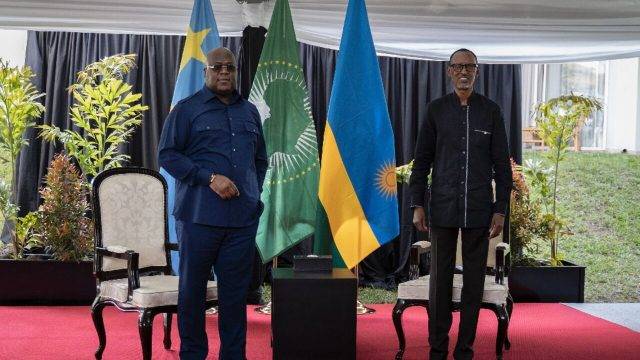In a significant diplomatic development, the Democratic Republic of the Congo (DRC) and Rwanda have agreed to draft a peace agreement by May 2, marking a renewed effort to de-escalate tensions in the conflict-ridden eastern region of the DRC. The move comes as the United States ramps up its diplomatic involvement and investment interests in the mineral-rich area.
The agreement was signed in Washington, D.C. on Friday during a high-stakes meeting between DRC Foreign Minister Therese Kayikwamba Wagner and her Rwandan counterpart, Olivier Nduhungirehe. Notably, the two ministers did not shake hands, reflecting the underlying tension that continues to characterize relations between the two neighbors.
The meeting was held under the auspices of the U.S. government and follows a surprise truce brokered by Qatar just two days earlier. The joint declaration commits both nations to respect each other’s territorial sovereignty and to cease any military assistance to non-state armed groups. While the declaration did not specifically name the M23 rebel group, it is widely seen as a central issue in the ongoing conflict.
Fighting between Congolese forces and the M23 rebels has intensified since January, leading to significant civilian casualties and the capture of strategic territories by the rebels. U.N. experts and the U.S. government have repeatedly accused Rwanda of supporting M23, claims Rwanda denies, asserting instead that its actions are driven by national security concerns and the presence of hostile militias in eastern DRC.
Minister Wagner interpreted the agreement as a step toward Rwandan troop withdrawal, aligning with previous U.N. Security Council directives. She emphasized the importance of a sincere commitment to peace, warning that durable stability would require transparency and sustained effort.
Rwandan Foreign Minister Nduhungirehe credited the U.S. for shifting the tone of dialogue, especially by linking peace to economic development and foreign investment. U.S. Secretary of State Marco Rubio, who witnessed the signing, described the deal as a "win-win" for both sides and hinted at potential American investment in DRC's energy and mining sectors—areas where Chinese interests are already well-established.
Despite the promise, observers remain cautious. Past peace initiatives—at least six since 2021—have all crumbled. With thousands of lives already lost this year alone, analyst Martin Ziakwau Lembisa underscored that U.S. involvement may be pivotal, but its long-term commitment remains uncertain.




No comments yet
Be the first to share your thoughts!